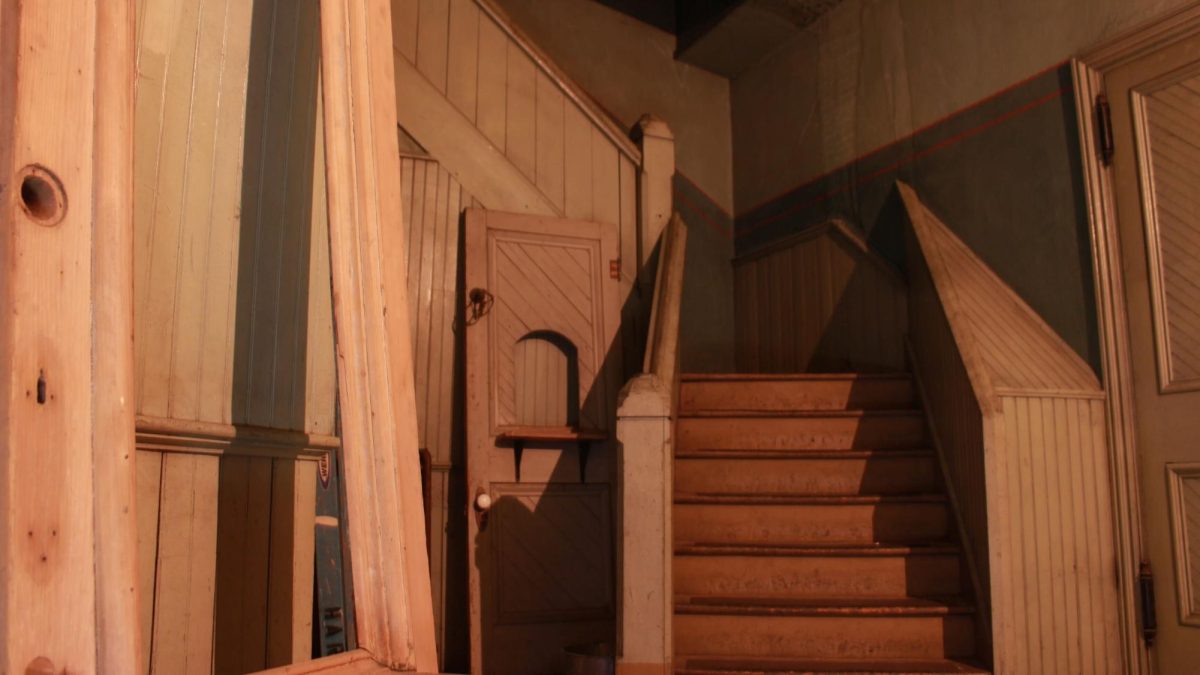Interview 11/04/22 | Hatchie
January 13, 2023
Harriette Pilbeam, known to many as Hatchie, has been one of the foremost voices in contemporary dream pop since the release of 2019’s Keepsake. In April of 2022, Pilbeam released Giving the World Away, a dream pop album which updated and reinterpreted tired ‘90s productions styles with a vigorous energy not seen since their initial heyday.
During Alex G’s tour for God Save The Animals, The Impact got a very special opportunity to interview Hatchie, alongside her husband and band-member Joe Agius. Between a trailer and a truck in a windy Detroit alleyway, Hatchie regaled about the music of her past, the effect of COVID-19 on her latest record and her musical process before the spectacular show.
Matt Cruz: What music did you listen to growing up? How has that shaped the Hatchie we know now?
Hatchie: I listened to lots of different music — I grew up in the ‘90s with older siblings who really influenced my music taste, whether it was as a kid listening to Britney Spears and Kiley Minogue, or when I was older, my brother introduced me to bands like Radiohead, the Raveonettes and more “indie” music that he probably found on places like Pitchfork, but I was too young to know what that was. It kind of depends. My parents listened to a lot of “old” music from the ‘70s and ‘80s like Billy Joel, Todd Rundgren, Carole King. Stuff like that taught me a lot about songwriting and harmonies.
Cruz: Besides your influence from ‘90s alt-dance group Saint Etienne, has there been any conscious influence from the UK baggy/Madchester scene? Stone Roses, Chapterhouse, Happy Mondays, Inspiral Carpets, 808 State?
Hatchie: Yeah, totally! Especially him [Joe]: Happy Mondays, Stone Roses, Primal Scream.
Agius: We love Chapterhouse.
Hatchie: Chapterhouse is especially a big influence, especially on the earlier stuff. I can’t think who else fits into that category that we were drawing inspiration from, but definitely.
Cruz: What about the shoegazing scene that was concurrent at the same time? What are your strongest influences?
Hatchie: Yeah! Especially on my earlier stuff, Cocteau Twins were a big influence and reference point, Slowdive and My Bloody Valentine and Lush. Most of those bands — I got into those bands a lot later than when most people do. A lot of people get into them when they’re teenagers but I didn’t really get into them until a bit later. I’m so into all of that.
Cruz: Are there any modern artists, either in the modern dream pop scene or elsewhere, that influence your music?
Hatchie: Probably. I can’t think of any immediately. This music came out in April, and we worked on it 18 months before that. I’d need to really think about who directly influenced anything. Joe, can you think of any modern artists?
Agius: Maybe Pains?
Hatchie: Yeah, I’m a big fan of The Pains of Being Pure at Heart, but I don’t think they influenced this record.
Cruz: Giving the World Away stands as one of the most refreshing dream pop albums I’ve heard in the past few years: How was the genesis of Giving the World Away impacted by COVID?
Hatchie: Oh, completely! Joe and I started, we went over to LA together for a writing trip in February of 2020. On that trip we wrote “Twin,” “This Enchanted,” “Lights On” and “Sunday Song”. Then we went home to Australia thinking that we were going to come back and finish the record soon, but we got stuck in Australia, so we finished the record — just the two of us — and sent the files over to our producer, Jorge Elbrecht, who was living in Denver. He did all the drums, the production and other instrumentation in Denver along with the drummer from Beach House (James Barone). Joe and I did the rest of the writing and recording on our end in Brisbane, and it allowed us to spend way more time on it. In Australia, everyone got a subsidy during COVID, so we got to focus on it completely and treat it as a job, like a nine-to-five for five days a week. It meant we could really go deep. We weren’t doing it at a studio; we were doing it at home. For that reason it was really good, but it was really difficult to do it over email because of the time difference. Not being in person to show someone what you wanted something to be like could sometimes hold us back a bit, but there were pros and cons.
Cruz: Do you think the time difference and the communication gap brought on by COVID allowed Giving the World Away to blossom into a very different record than originally planned?
Hatchie: Yes! Definitely. I think we spent every hour that we wanted to on it. The only thing I wonder that could’ve been different is that if we had written the rest of the album with Jorge. We did “This Enchanted” and “Lights On” with him, and I wonder if the record would have sounded more like that, but we’ll never know.
Cruz: Why did you decide to explore and reinterpret these textures of shoegaze, dream pop and alternative dance?
Hatchie: I don’t know — it was just the music we were listening to at home. Being stuck at home during lockdown, we were listening to a lot of party music to make the days pass. That’s where the dance influence came. I thought it was going to be more of a lighthearted, fun album. Being locked inside made the album more introspective and more like a personal diary than I was expecting. I originally thought it was going to be more like “This Enchanted” — more “90’s-UK-baggy-dance,.” but then it kind of turned into a more personal and autobiographical work because we were at home.
Cruz: How do you think of sound when writing songs? What comes first and what do you think is most important? Do you find yourself playing melodies in your head? Or tapping to rhythms you think of? The atmosphere? How does a Hatchie song usually begin?
Hatchie: It’s different every time. With this album, I don’t think any songs started with lyrics; they started with melodies and rhythms. It depends on certain songs: Joe started writing them and I helped finish it. Others, it was vice versa. I think “Lights On” started with a drum rhythm, and “The Rhythm” started with a synth and a drum. It depends: If I’m the one who starts writing it, it’s usually a vocal melody and a chord progression, but it changes. I don’t have an answer for what’s “most important” — I think it changes and for everyone it’s completely subjective.
Cruz: In the wake of the record’s release, how has your approach to recording music or exploring dream pop textures changed?
Hatchie: Now I think I’m going to focus a lot more on starting with lyrics and going with a more simple approach. With this album, because we had so much time to work on it, we obsessed over the finer details and production. I’m glad that we did that because that was what we set out to produce — create a highly produced, energetic album that made sense to perform live on a big stage. We were craving to get back into playing live shows after lockdown. Now I think I just want to ease back into more simple songs that really rely on the songwriting rather than the production, but it’s very early days for the next stuff, so we’ll see!
































